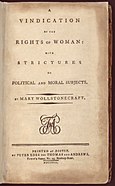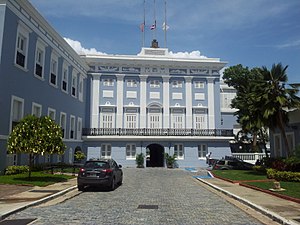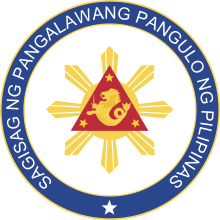
Back Portal:Politik ALS بوابة:السياسة Arabic بوابة:سياسة ARZ Портал:Политика Bulgarian প্রবেশদ্বার:রাজনীতি Bengali/Bangla Portal:Politika BS دەروازە:سیاسەت CKB Portál:Politika Czech Portal:Politik German Portal:Siyaset DIQ
| Main | Topics and categories | Tasks and projects |
The Politics portal
Politics (from Ancient Greek πολιτικά (politiká) 'affairs of the cities') is the set of activities that are associated with making decisions in groups, or other forms of power relations among individuals, such as the distribution of resources or status. The branch of social science that studies politics and government is referred to as political science.
It may be used positively in the context of a "political solution" which is compromising and non-violent, or descriptively as "the art or science of government", but also often carries a negative connotation. The concept has been defined in various ways, and different approaches have fundamentally differing views on whether it should be used extensively or in a limited way, empirically or normatively, and on whether conflict or co-operation is more essential to it.
A variety of methods are deployed in politics, which include promoting one's own political views among people, negotiation with other political subjects, making laws, and exercising internal and external force, including warfare against adversaries. Politics is exercised on a wide range of social levels, from clans and tribes of traditional societies, through modern local governments, companies and institutions up to sovereign states, to the international level.
In modern nation states, people often form political parties to represent their ideas. Members of a party often agree to take the same position on many issues and agree to support the same changes to law and the same leaders. An election is usually a competition between different parties.
A political system is a framework which defines acceptable political methods within a society. The history of political thought can be traced back to early antiquity, with seminal works such as Plato's Republic, Aristotle's Politics, Confucius's political manuscripts and Chanakya's Arthashastra. (Full article...)
Selected article
A Vindication of the Rights of Woman is a 1791 book of feminist philosophy by Mary Wollstonecraft. In it, Wollstonecraft responds to the educational and political theorists of the eighteenth century who wanted to deny women an education. She argues that women ought to have an education commensurate with their position in society, claiming that women are essential to the nation because they educate its children and because they could be "companions" to their husbands, rather than mere wives. Instead of viewing women as ornaments to society or property to be traded in marriage, Wollstonecraft maintains that they are human beings deserving of the same fundamental rights as men. Wollstonecraft was prompted to write the Rights of Woman by Charles Maurice de Talleyrand-Périgord's 1791 report to the French National Assembly which stated that women should only receive a domestic education; she used her commentary on this specific event to launch a broad attack against sexual double standards and to indict men for encouraging women to indulge in excessive emotion. Wollstonecraft wrote the Rights of Woman hurriedly in order to respond directly to ongoing events; she intended to write a more thoughtful second volume, but she died before completing it.
Featured picture

Aletta Jacobs (1854–1929) was a Dutch physician and women's suffrage activist. Jacobs strove throughout her life to change laws that limited women's access to equality, starting in 1883 with an unsuccessful court challenge and eventually achieving success on 18 September 1919, with the signing of a suffrage bill into law. In addition to her suffrage work she led campaigns aimed at deregulating prostitution, improving women's working conditions, and promoting peace.
Selected quote
Selected biography
Luís Alves de Lima e Silva, Duke of Caxias (pronounced [kaˈʃi.ɐs]; 25 August 1803 – 7 May 1880), nicknamed "The Peacemaker" and "The Iron Duke", was an army officer, politician and monarchist of the Empire of Brazil. Like his father and uncles, Caxias pursued a military career. In 1823 he fought as a young officer in the Brazilian War for Independence against Portugal, then spent three years in Brazil's southernmost province, Cisplatina, as the government unsuccessfully resisted that province's secession in the Cisplatine War. Though his own father and uncles renounced Emperor Dom Pedro I during the protests of 1831, Caxias remained loyal. Pedro I abdicated in favor of his young son Dom Pedro II, whom Caxias instructed in swordsmanship and horsemanship and eventually befriended.
Did you know (auto-generated) -

- ... that Crossing a Line compares Palestinian political expression on either side of the Green Line between Israel and the occupied Palestinian territories?
- ... that Czech television reporter and author Vladimír Škutina was arrested and imprisoned twice for his use of political satire?
- ... that the continuing influence of the Catholic Church in the politics of the Philippines means that the country lacks a divorce law?
- ... that Olga Onuch is believed to be the first professor of Ukrainian politics in the English-speaking world?
- ... that Angel Joy Chavis Rocker, a guidance counselor with no political experience, was the first black woman to run for President of the United States as a Republican?
- ... that Jonathan Allen left journalism for politics before quitting 40 days later?
More did you know...
- ...that the Communist League of America was formed after some members of the Communist Party USA were expelled for Trotskyism?
- ...that Matt Taibbi's book Griftopia has been described as a "necessary ... corrective" to the assertion that bubbles are an inevitable part of the market economy?
- ...that in the book Net.wars, author Wendy M. Grossman attributes Internet conflict in the 1990s to culture shock from an influx of users?
- ...that former California Assembly Republican Leader and California Republican Party Chair Robert W. Naylor was editor of The Stanford Daily while he was a student at Stanford University?
- ...that Caedwalla of Wessex conquered southeast England during his brief 7th century reign?
- ...that when the Tennessee Center for Policy Research, a "free-market think tank," criticized Al Gore's energy use, CNN mistakenly called the organization an environmental group?
In this month
- July 20, 1944 – an assassination attempt is made on Adolf Hitler with involvement by notable German conservatives.
- July 23, 1952 – The European Coal and Steel Community is established.
- July 27, 1830 – King Charles X of France is overthrown in the French Revolution of 1830, also known as the July Revolution.
- July 31, 1912 – American conservative economist, statistician, and Nobel Prize winner Milton Friedman is born.
News and Current events
- August 11: 4 local government areas in New South Wales, Australia locked down after COVID-19 case
- August 11: Australia: AstraZeneca vaccine access expanded by Victorian government
- August 1: Australia: Victorian lockdown lifted
- July 29: Tunisia's president dismisses prime minister, suspends parliament
- July 25: Australia: Wikinews interviews Reg Kidd, mayor of the City of Orange, about COVID-19 lockdown and local government
- July 23: South Australia enters week-long lockdown to contain COVID-19 Delta variant spread
- July 21: Technological University Dublin senior lecturer Dr Lorcan Sirr speaks to Wikinews on housing market in Ireland
- July 21: Three rural councils in New South Wales, Australia enter 7-day lockdown
- July 21: Australia: Victoria lockdown extended by a week with 85 active cases recorded
- July 15: California governor signs new state budget, eligible Californians to get stimulus payments
Topics and categories
General images
Related portals
Associated Wikimedia
The following Wikimedia Foundation sister projects provide more on this subject:
-
Commons
Free media repository -
Wikibooks
Free textbooks and manuals -
Wikidata
Free knowledge base -
Wikinews
Free-content news -
Wikiquote
Collection of quotations -
Wikisource
Free-content library -
Wikiversity
Free learning tools -
Wiktionary
Dictionary and thesaurus
Sources
More portals
© MMXXIII Rich X Search. We shall prevail. All rights reserved. Rich X Search


























































